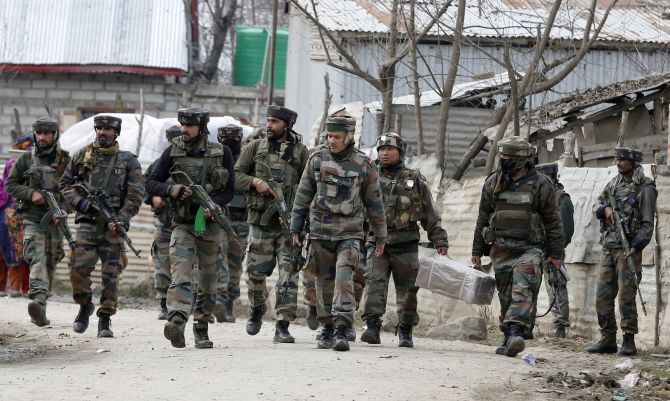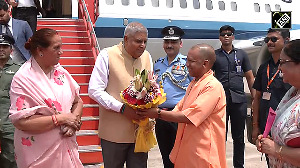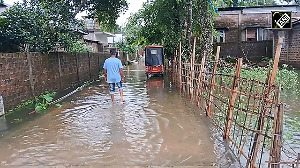'General Rawat's unambiguous stand has acted as a much needed confidence booster to the troops -- young officers and soldiers at the cutting edge -- who were often left wondering if they were doing the right and necessary thing in combating the terrorists, many times paying with their own lives,' says Nitin A Gokhale.

There was one section -- and I don't want to call them intellectuals -- which pays lip service to the fauj, but in reality stands against everything that the army seeks to protect and defend.
This group has variously dubbed the army chief's remark as an 'intemperate statement,' 'belligerent stand,' and 'declaration of war against Kashmiri youth.'
This group of people have sought to create an impression that the army chief has ordered his troops to kill and maim indiscriminately.
This is nothing but deliberate distortion of an emphatic assertion by a professional entrusted with the security of the country. But more of that a little later.
General Rawat's unambiguous stand has acted as a much needed confidence booster to the troops -- young officers and soldiers at the cutting edge -- who were often left wondering if they were doing the right and necessary thing in combating the terrorists, many times paying with their own lives.
In the wake of elimination of Burhan Wani, a local youth-turned terrorist leader last year and the subsequent turmoil in the Kashmir valley, abetted in no small measure by the Pakistani Deep State through selfish and self-centred separatist leaders, politics had dominated the discourse on J&K.
It was conveniently forgotten that irrespective of his origin (as a Kashmiri youth), Burhan Wani was after all a terrorist whose days were numbered once he took up arms against the Indian State.
His killing in an encounter with the security forces should have been treated as just that -- neutralisation of a terrorist.
Instead, a narrative was sought to be built, blaming the security forces for doing their job and doing it professionally.
The months of unrest that followed Burhan Wani's death often hampered the movement of the security forces, disrupted their logistics chain and disturbed a well laid out security grid.
The successful surgical strikes by the Indian Army's special forces against terrorist launch pads located in Pakistan occupied Kashmir was preceded and followed by two setbacks for the Indian Army at Uri and Nagrota respectively.
The army can take the setbacks in its stride and learn lessons from them, but what demoralises the soldiers are the barely concealed barbs by ill-informed critics who do not have the faintest idea about the difficulties and constraints under which the troops have been operating in the unending war in J&K for over a quarter century now.
No army in the world has maintained the relentless tempo of operations as the Indian Army has done since 1990.
It is to the credit of the Indian Army's leadership over the years that the troops have retained the highest degree of motivation despite mounting odds.
However, the unwarranted criticism about strategy and tactics and the contempt that some of our prominent opinion makers hold against the army had begun to affect the soldiers on the ground.
A slight hesitation had started to creep in in their approach to counter-insurgency and counter-terrorists operations.
Fortunately, the army chief's statement would have removed any lingering doubts the soldiers may have had about the necessity of their job and their role.
At another level, the army chief's warning to those hindering operations and the support extended to him by the political leadership over his stand should send the right message to those fishing in Kashmir's troubled waters.
The separatists cannot use unsuspecting young men and women as cannon fodder for their own agenda and get away with it.
The Kashmiri awam must question the separatists: How long are you going to fire from the shoulders of ordinary Kashmiris?
There have been suggestions that the Centre must reach out to the youth of Kashmir.
Perhaps the time has come to do just that and ignore the usual suspects, but before that the youth must begin to understand the difference between mindless protests and legitimate demands.
Politics apart, Kashmiri parents must also begin to ask the question to themselves: Why allow the young to be used as a smoke screen for political objectives?
Perhaps the stern warning that those who hamper legitimate army operations will not be spared should spur families in Kashmir to ask that question sooner than later.
So for all those who outrage against the army chief's statement: hold your thoughts. He is not seeking any impunity for his troops.
All that he is asking for is the right of the Indian Army to exercise its legitimate powers given under the very Constitution by which you claim to swear.
Nitin A Gokhale is the Editor-in-Chief, BharatShakti.in and a long-standing Rediff.com columnist.
MUST READ columns in the RELATED LINKS below.
IMAGE: Indian Army soldiers during an encounter in Bandipore, Jammu and Kashmir, February 4, 2016. Photograph: Umar Ganie











